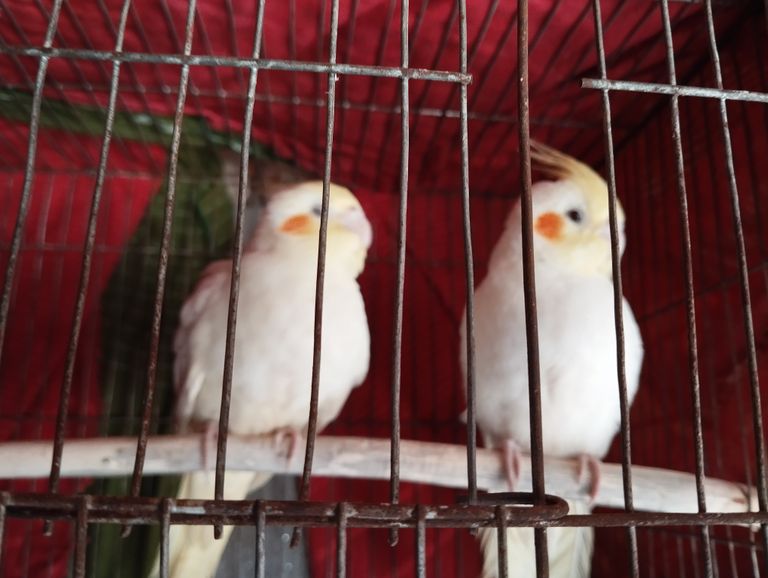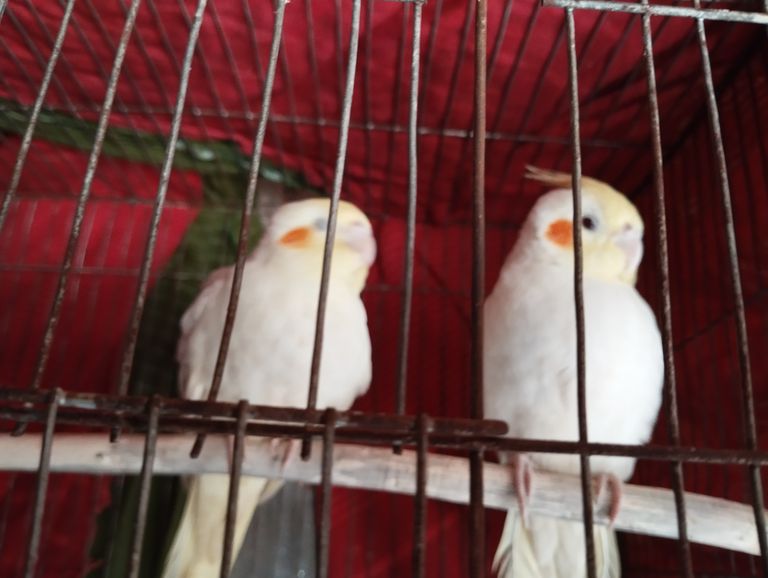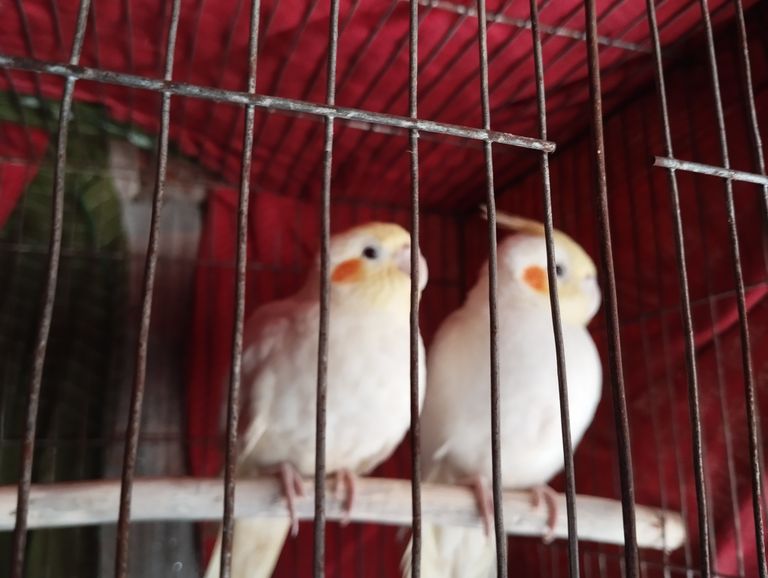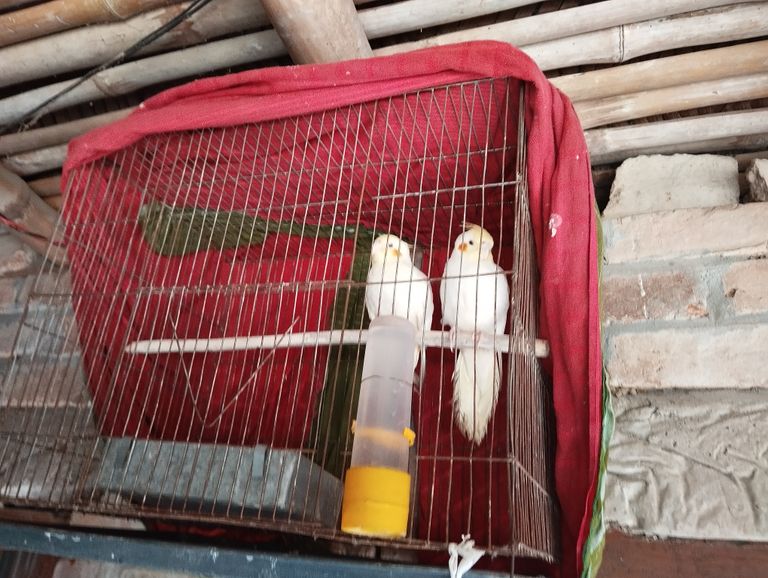
Raising Cockatiels in a Cage A Comprehensive Guide.
Cockatiels are among the most popular pet birds worldwide due to their friendly nature, playful demeanor, and ease of care. They are relatively small, making them ideal for apartment living or homes with limited space. If you're considering raising a cockatiel in a cage, this guide will walk you through all the essentials to ensure your bird thrives.
- Choosing the Right Cage
The cage is your cockatiel's home, so choosing the right one is crucial.
Size: A minimum size of 24x18x24 inches is recommended for a single cockatiel. If you plan to keep multiple birds, ensure the cage is significantly larger.
Bar Spacing: The spacing between bars should be 0.5 to 0.75 inches to prevent the bird from escaping or injuring itself.
Shape: Rectangular cages are preferred over round ones, as they provide more usable space.
Material: Opt for cages made of stainless steel or powder-coated metal to prevent rust and toxicity.
- Cage Placement
Proper placement of the cage ensures your cockatiel feels safe and comfortable.
Location: Place the cage in a well-lit area with natural light but away from direct sunlight. Avoid areas with drafts, such as near windows or air conditioners.
Height: Position the cage at eye level to make the bird feel secure and to facilitate interaction.
Noise Levels: Keep the cage in a moderately quiet area. Cockatiels enjoy some background noise but may get stressed by constant loud sounds.
- Setting Up the Cage
To make the cage a stimulating and comfortable environment:
Perches: Include perches of varying diameters made from natural wood to help maintain healthy feet. Avoid sandpaper-covered perches, as they can irritate the bird's feet.
Toys: Provide toys like bells, swings, and chewable items to prevent boredom. Rotate toys regularly to keep your bird engaged.
Food and Water Bowls: Use separate bowls for food and water. Position them at a height the bird can easily access.
Lining: Use newspaper or bird-safe cage liners at the bottom for easy cleaning. Avoid wood shavings, as they can be hazardous.
- Nutrition and Diet
A balanced diet is essential for your cockatiel's health.
Pellets: High-quality pellets should make up the majority of their diet.
Fresh Foods: Offer a variety of fruits, vegetables, and leafy greens. Popular choices include carrots, spinach, apples, and sweet potatoes.
Seeds: While seeds are a natural part of their diet, they should be given in moderation due to their high fat content.
Water: Always provide fresh, clean water. Change it daily to prevent bacterial growth.
Avoid Toxic Foods: Never feed your cockatiel avocado, chocolate, caffeine, or alcohol.
- Health and Hygiene
Maintaining a clean environment is key to preventing illnesses.
Cleaning the Cage: Clean the cage weekly, including perches, toys, and food bowls.
Bathing: Cockatiels enjoy bathing. Provide a shallow dish of water or mist them lightly with a spray bottle.
Veterinary Care: Schedule regular check-ups with an avian vet. Watch for signs of illness such as lethargy, puffed-up feathers, or changes in appetite.
- Social Interaction and Training
Cockatiels are social birds that thrive on interaction.
Daily Interaction: Spend at least an hour interacting with your bird each day. Talk to them, whistle, or let them perch on your hand.
Training: Cockatiels are intelligent and can learn simple tricks like stepping onto your hand or mimicking whistles. Use positive reinforcement techniques like treats and praise.
- Breeding Cockatiels
If you plan to breed cockatiels, keep the following in mind:
Breeding Pair: Ensure you have a compatible male and female pair.
Nesting Box: Provide a nesting box inside the cage for the female to lay eggs.
Diet: Offer calcium-rich foods like cuttlebone to support egg-laying.
Privacy: Place the cage in a quiet area to minimize stress during the breeding process.
- Common Behavioral Issues
Cockatiels are generally well-behaved, but they may develop certain issues:
Biting: Often a sign of fear or territorial behavior. Handle your bird gently and build trust.
Feather Plucking: Caused by stress, boredom, or illness. Provide a stimulating environment and consult a vet if it persists.
Screaming: Excessive noise is often a call for attention. Ensure they have enough interaction and mental stimulation.
- Lifespan and Commitment
Cockatiels can live up to 15–20 years with proper care. Owning a cockatiel is a long-term commitment, so be prepared to provide consistent love and attention.
- Final Thoughts
Raising a cockatiel in a cage can be a rewarding experience if done correctly. By providing a spacious cage, a nutritious diet, and plenty of social interaction, you’ll have a happy and healthy companion. Remember, every bird has a unique personality, so take the time to understand and bond with your feathered friend.

Common Diseases in Cockatiels: A Comprehensive Guide
Cockatiels are charming and affectionate pet birds known for their playful personalities and melodic whistles. Like all pets, cockatiels can suffer from a variety of health issues. Recognizing the signs of common diseases and understanding their causes can help ensure a long, healthy life for your feathered companion. In this blog, we’ll explore the most common diseases in cockatiels, their symptoms, prevention, and treatment methods.
- Psittacosis (Parrot Fever)
Cause: Psittacosis is caused by the bacterium Chlamydia psittaci and is highly contagious, not just to other birds but also to humans.
Symptoms:
Lethargy and weakness
Loss of appetite
Nasal discharge
Difficulty breathing
Green or watery droppings
Prevention:
Maintain a clean cage and environment.
Quarantine new birds before introducing them to others.
Treatment:
Psittacosis is treatable with antibiotics such as doxycycline. Consult a vet immediately if your cockatiel shows symptoms.
- Respiratory Infections
Cause: These infections can result from bacteria, fungi, or viruses and are often triggered by poor ventilation, dusty environments, or sudden temperature changes.
Symptoms:
Sneezing or wheezing
Tail bobbing while breathing
Nasal discharge
Open-mouthed breathing
Prevention:
Provide proper ventilation and avoid exposure to drafts.
Keep the cage clean and free from dust.
Treatment:
Antibiotics or antifungal medications prescribed by a veterinarian.
Ensure your bird is kept warm and stress-free during recovery.
- Feather Plucking and Mites
Cause: Feather plucking can result from stress, boredom, malnutrition, or skin irritation caused by mites.
Symptoms:
Excessive preening
Bald patches on the body
Red or irritated skin
Prevention:
Provide mental stimulation with toys and interaction.
Feed a balanced diet and ensure proper cage hygiene.
Treatment:
Address the underlying cause of stress.
Consult a vet for mite infestations; topical or oral treatments may be required.
- Fatty Liver Disease
Cause: A high-fat diet, often due to excessive seed consumption, can lead to fatty liver disease (hepatic lipidosis).
Symptoms:
Obesity
Lethargy
Yellowish discoloration of droppings
Enlarged abdomen
Prevention:
Offer a balanced diet with pellets, fresh fruits, and vegetables.
Limit seeds and fatty foods.
Treatment:
Diet modification is crucial.
Your vet may prescribe supplements like milk thistle to support liver health.
- Egg Binding
Cause: Female cockatiels may suffer from egg binding, where an egg gets stuck in the reproductive tract. This condition can be life-threatening.
Symptoms:
Straining to lay an egg
Swelling around the vent
Weakness or lethargy
Labored breathing
Prevention:
Ensure adequate calcium intake through diet or supplements.
Avoid over-stimulating breeding behavior.
Treatment:
Immediate veterinary intervention is required.
Warm baths and calcium injections may help in mild cases, but surgery might be necessary in severe cases.
- Candidiasis (Fungal Infection)
Cause: This infection is caused by the fungus Candida albicans, often due to poor hygiene or an imbalanced diet.
Symptoms:
White patches in the mouth or throat
Regurgitation
Loss of appetite
Diarrhea
Prevention:
Maintain a clean cage and provide fresh food and water daily.
Avoid overuse of antibiotics, as this can disrupt gut flora.
Treatment:
Antifungal medications such as nystatin or fluconazole.
- Sour Crop
Cause: Sour crop occurs when food in the crop (a part of the digestive system) ferments due to bacterial or fungal overgrowth.
Symptoms:
Swollen or distended crop
Regurgitation with a sour smell
Reduced appetite
Prevention:
Feed your bird fresh, appropriate foods and avoid overfeeding.
Ensure proper hygiene in food and water dishes.
Treatment:
A vet may flush the crop and prescribe medications to treat the underlying infection.
- Beak and Feather Disease (PBFD)
Cause: PBFD is caused by a virus and is often fatal. It attacks the immune system, feathers, and beak.
Symptoms:
Abnormal feather growth or loss
Deformed beak
Lethargy
Weakness
Prevention:
Quarantine new birds and practice strict hygiene.
There is no vaccine, so early detection and isolation are crucial.
Treatment:
PBFD has no cure, but supportive care can improve the quality of life.
Tips for General Health Maintenance
- Regular Vet Checkups: Schedule annual checkups to catch health issues early.
- Balanced Diet: Ensure your cockatiel gets a mix of seeds, pellets, fresh fruits, and vegetables.
- Clean Environment: Clean the cage, perches, and food dishes regularly.
- Mental Stimulation: Provide toys and interaction to prevent stress-related issues.
- Observation: Monitor your cockatiel’s behavior, droppings, and physical appearance for any changes.
Cockatiels are resilient birds, but they require proper care and attention to stay healthy. By understanding the common diseases that affect cockatiels and taking proactive measures, you can ensure your pet thrives in a safe and loving environment. Always consult an avian veterinarian if you notice any signs of illness, as early intervention is key to successful treatment.
Your cockatiel relies on you for its well-being, so keep an eye out for potential health issues and provide the best care possible.

A Complete Guide to Cockatiel Diet: What Should You Feed Your Pet Cockatiel?
Cockatiels are one of the most beloved pet birds worldwide due to their friendly nature and striking beauty. Ensuring their health and happiness requires providing a balanced diet tailored to their specific nutritional needs. In this guide, we’ll explore everything you need to know about feeding your cockatiel.
Why a Proper Diet is Important for Cockatiels
Cockatiels have a lifespan of 15–25 years when provided with the right care, including a healthy diet. Poor nutrition can lead to various health issues, such as obesity, vitamin deficiencies, and organ failure. A well-balanced diet ensures your cockatiel’s feathers remain vibrant, their energy levels high, and their immune system strong.
Essential Components of a Cockatiel’s Diet
- Seeds
Seeds are a staple in a cockatiel’s diet, but they should not be the sole source of nutrition. While seeds like millet, sunflower, and canary grass seeds are favorites, they are high in fat and lack essential nutrients.
Tip: Offer a seed mix that contains a variety of seeds in moderation.
- Pellets
Pellets are specially formulated to provide balanced nutrition. They are an excellent supplement or replacement for seed-heavy diets.
Benefits: Pellets are less messy, contain essential vitamins and minerals, and prevent selective eating.
Tip: Choose high-quality, vet-recommended pellets designed for cockatiels.
- Fresh Fruits
Cockatiels enjoy the natural sweetness of fruits, which are packed with vitamins and antioxidants.
Safe Options: Apples (without seeds), bananas, grapes, papayas, mangoes, and berries.
Avoid: Avocado, as it is toxic to birds.
Serving Tip: Wash thoroughly and serve in small pieces.
- Vegetables
Vegetables are crucial for your cockatiel’s diet, providing fiber and essential nutrients.
Safe Options: Carrots, broccoli, spinach, kale, peas, and sweet potatoes.
Avoid: Onions, garlic, and raw beans.
Serving Tip: Offer raw or steamed vegetables to retain nutrients.
- Grains and Legumes
Cooked grains like rice, quinoa, and barley, along with lentils and chickpeas, can be a nutritious treat.
Tip: Avoid seasoning or adding salt.
- Protein
Cockatiels occasionally require extra protein, especially during molting or breeding.
Sources: Cooked eggs, tofu, or small amounts of cooked chicken.
Tip: Serve protein-rich foods sparingly.
Foods to Avoid
Some foods are harmful or even toxic to cockatiels. Avoid the following at all costs:
- Chocolate
- Caffeine
- Alcohol
- Avocado
- Onions and garlic
- Salty or sugary foods
- Junk food (chips, cookies, etc.)
How to Feed Your Cockatiel
- Create a Balanced Routine
A typical daily diet for a cockatiel should consist of:
60% pellets
20% fresh vegetables
10% fruits
10% seeds or grains
- Fresh Water
Always provide clean, fresh water. Replace it daily to prevent contamination.
- Use Feeders
Use clean, bird-safe feeders for seeds, pellets, and fresh foods. Avoid placing wet foods in the same container as dry foods to prevent spoilage.
- Avoid Overfeeding
Cockatiels have small stomachs and should not be overfed. Remove uneaten fresh foods after 2–3 hours to prevent bacterial growth.
Homemade Treat Ideas for Cockatiels
- Fruit Skewers
Thread small pieces of apple, grape, and melon on a skewer for a fun treat.
- Vegetable Chips
Bake thin slices of carrots or sweet potatoes for a crunchy snack.
- Seed Balls
Mix seeds with honey and shape them into small balls. Allow them to dry before serving as an occasional treat.
Signs of a Healthy Diet
A healthy cockatiel will exhibit the following signs:
Vibrant and smooth feathers.
High energy and playful behavior.
Regular and firm droppings.
Healthy appetite.
If your cockatiel appears lethargic, loses weight, or has dull feathers, consult a veterinarian immediately.
Feeding your cockatiel a varied and balanced diet is the key to ensuring their long-term health and happiness. By combining seeds, pellets, fresh produce, and occasional treats, you can create a diet that meets all their nutritional needs. Always observe your pet’s eating habits and consult a vet for personalized advice.
Your feathered friend depends on you for their care—make their meals as enriching as their company is to you.

A Complete Guide to Cockatiel Diet: What Should You Feed Your Pet Cockatiel?
Cockatiels are one of the most beloved pet birds worldwide due to their friendly nature and striking beauty. Ensuring their health and happiness requires providing a balanced diet tailored to their specific nutritional needs. In this guide, we’ll explore everything you need to know about feeding your cockatiel.
Why a Proper Diet is Important for Cockatiels
Cockatiels have a lifespan of 15–25 years when provided with the right care, including a healthy diet. Poor nutrition can lead to various health issues, such as obesity, vitamin deficiencies, and organ failure. A well-balanced diet ensures your cockatiel’s feathers remain vibrant, their energy levels high, and their immune system strong.
Essential Components of a Cockatiel’s Diet
- Seeds
Seeds are a staple in a cockatiel’s diet, but they should not be the sole source of nutrition. While seeds like millet, sunflower, and canary grass seeds are favorites, they are high in fat and lack essential nutrients.
Tip: Offer a seed mix that contains a variety of seeds in moderation.
- Pellets
Pellets are specially formulated to provide balanced nutrition. They are an excellent supplement or replacement for seed-heavy diets.
Benefits: Pellets are less messy, contain essential vitamins and minerals, and prevent selective eating.
Tip: Choose high-quality, vet-recommended pellets designed for cockatiels.
- Fresh Fruits
Cockatiels enjoy the natural sweetness of fruits, which are packed with vitamins and antioxidants.
Safe Options: Apples (without seeds), bananas, grapes, papayas, mangoes, and berries.
Avoid: Avocado, as it is toxic to birds.
Serving Tip: Wash thoroughly and serve in small pieces.
- Vegetables
Vegetables are crucial for your cockatiel’s diet, providing fiber and essential nutrients.
Safe Options: Carrots, broccoli, spinach, kale, peas, and sweet potatoes.
Avoid: Onions, garlic, and raw beans.
Serving Tip: Offer raw or steamed vegetables to retain nutrients.
- Grains and Legumes
Cooked grains like rice, quinoa, and barley, along with lentils and chickpeas, can be a nutritious treat.
Tip: Avoid seasoning or adding salt.
- Protein
Cockatiels occasionally require extra protein, especially during molting or breeding.
Sources: Cooked eggs, tofu, or small amounts of cooked chicken.
Tip: Serve protein-rich foods sparingly.
Foods to Avoid
Some foods are harmful or even toxic to cockatiels. Avoid the following at all costs:
- Chocolate
- Caffeine
- Alcohol
- Avocado
- Onions and garlic
- Salty or sugary foods
- Junk food (chips, cookies, etc.)
How to Feed Your Cockatiel
- Create a Balanced Routine
A typical daily diet for a cockatiel should consist of:
60% pellets
20% fresh vegetables
10% fruits
10% seeds or grains
- Fresh Water
Always provide clean, fresh water. Replace it daily to prevent contamination.
- Use Feeders
Use clean, bird-safe feeders for seeds, pellets, and fresh foods. Avoid placing wet foods in the same container as dry foods to prevent spoilage.
- Avoid Overfeeding
Cockatiels have small stomachs and should not be overfed. Remove uneaten fresh foods after 2–3 hours to prevent bacterial growth.